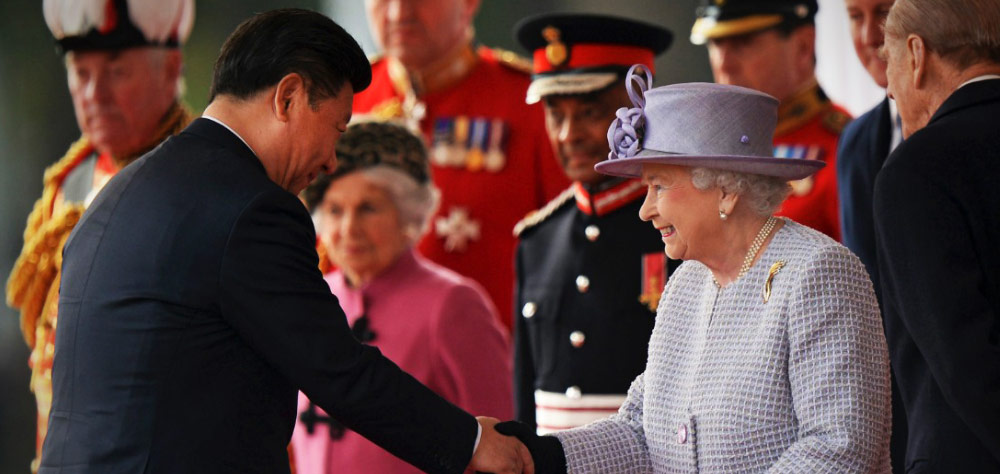Alwaght- In mid-19th century, China and the then powerful British Empire fought each other in what was later dubbed "opium wars" as the Chinese leaders sought to stop opium from being smuggled into their country. China lost the war to the largely-modern British military and had to pay dearly. It had to pay the colonial Britain compensation, open its ports to the trade with London, and accede to rule of Hong Kong by Britain.
The defeat and the resultant concessions ushered in a period of conflicts and tensions that only ended after Britain give back Hong Kong governance to the mainland China in 1997. Since then, the two countries' relations headed to improvement.
The former British Prime Minster David Cameron visited China, now the world's second largest economy, last time in July 2015, leading a high-ranking delegation. The news reports at the time said that the two countries signed a £40 billion ($52 billion) trade and investment pact. President Xi Jingping of China also made a "historic" visit to Britain in October 2015, opening a new chapter in London-Beijing ties.
Now that the two countries are projecting expansion of their trade relations, Britain's exit from the European Union and thus getting rid of the bloc's cumbersome rules can even provide Britain with a fresh scope to boost mutual trade deals with the giant Asian economy, and even beyond that it can reach a free trade agreement with the first Asian economy. With the concerns about protectionism policies— like those implemented by the US President Donald Trump— growing by China, the British market can prove an easy prey for the Chinese goods. This can be understood better if we know that the EU adopts strict rules to limit food imports from China and steel trade with it.
When Brexit is accomplished, they should expect easier mutual financial services as China as part of its efforts to economic reform will restructure its markets and the enormous state-owned businesses. This will provide China with a new chance of receiving financing from Britain to proceed with reform plans.
However, concerns are brewing that Brexit will negatively impact Britain's position as one of the top global financial centers. On the opposite side, some experts suggest that if the British can develop effective trade contacts with developing economic powers such as China and India, Brexit in the long run will be a profitable step from which the economy will benefit.
China, however, will have its own expectations from Britain, including:
First, China will bid for the British support as Beijing fights for "market economy status", a condition makes it qualified for World Trade Organization membership. China has been facing tough EU and US commercial actions while it struggled to expand its global trade by joining the WTO.
Second, British should keep being a secure place for the Chinese investments. In fact, Beijing will ask London to facilitate investment for the Chinese investors with removing complicated business regulations characteristic of the US and the EU.
Third, the potential trade rows of China with the US will push Beijing to engage in firm financial and commercial relations with other Western economic powers like London that more passionately believe in the free trade principles and multi-polarism.
Now China is the seventh largest trade partner of Britain in terms of export volume. 3.6 percent of the British exported products go to the Chinese markets. However, the goods and services exchange between them is far from balanced, as China has considerable surplus in its trade with Britain. China is the third origin of goods imported to the British markets. Seven percent of the total British imports come from China. British trade with China hit the £17 billion ($22 billion) last year.
China is a key market for British goods as it has the largest population and a thriving economic growth. The two countries' trade has seen a persistent increase over the course of past decade, jumping from the £24 billion ($31 billion) in 2006 to over £60 billion ($78 billion) in 2016. China is a lucrative market for a diversity of products including electric devices and machines, road construction equipment, metals, transportation vehicles, raw materials, chemicals, and a litany of others. But the British share from this market is only 1 percent, while other European powers have managed to do better in profiting from China's markets.
According to figures published by the International Monetary Fund, China's imports in 2020 will hit $3.6 trillion, a considerable expansion that can provide the British companies with a rare opportunity to cut distance with rivals in the emerging Asian market.
China has already launched tremendous investment in Britain, including a project to construct the 3,200 MWe Hinkley Point nuclear power plant in Somerset in southwest England. The project will inaugurate a major Chinese role in the country's nuclear industry.
Additionally, Britain looks determined to join China's rising financial orbit. Despite apparent American concerns and even discomfort, London was the first, among other US allies like Australia, Canada, France, and Germany, to join the Chinese-headed and based Asian Infrastructure Investment Bank. Many described the London going on board beside Beijing as marking a new period on the global order in which Asia and particularly Beijing will play a far greater role on the international stage.
Generally, now that Britain voted for quitting the EU, it is crucial for it to bolster bilateral ties with the emerging economies like China, as well as the BRICS bloc that contains Brazil, Russia, India, China, and South Africa. This is a must for London if it seeks saving its status as one of the world's leading financial hubs. Massive criticism against Brexit and perhaps the subsequent restrictions on the country that bring about fears of drop in London's economic significance worldwide make the British leaders zealous to widen commercial links to the top Asian economy with its huge consumption market.



























